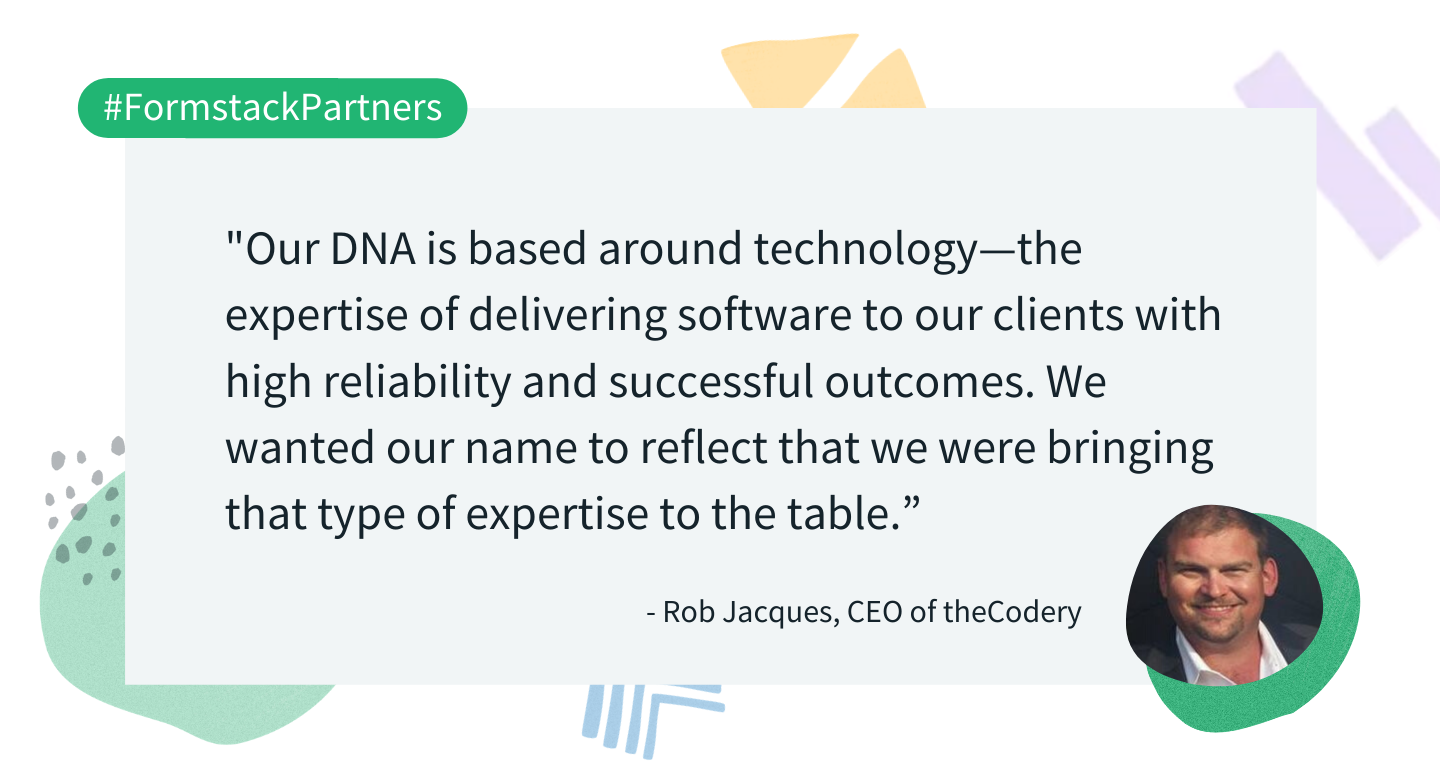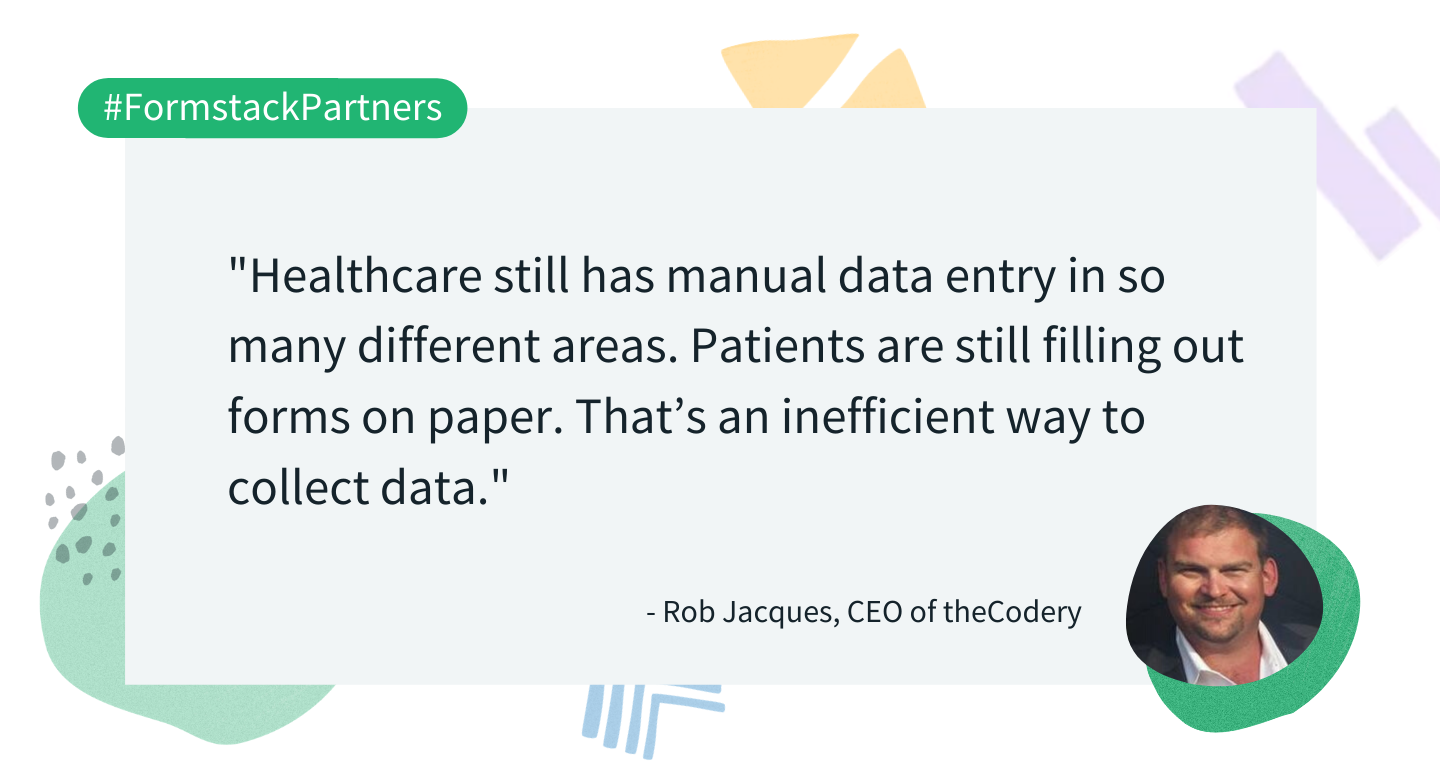Our VP of Partnerships Zak Pines recently sat down with Rob Jacques, CEO of theCodery, as part of our ongoing Partner Interview Series. Zak and Rob had a far-ranging conversation that touched on how theCodery got its name; opportunity Rob sees for Salesforce Health Cloud; and digital transformation in healthcare starting with digital patient intake forms. Here’s an abridged transcript of the chat.
theCodery: Background & Name
Zak: TheCodery—what a great name. Can you start by telling me about the business?
Rob: We founded the business in November 2018. We do Salesforce systems integration and implementation. We’ve focused very much on healthcare—across providers, payors, medical devices, and pharma. We work extremely closely with Salesforce’s Health Cloud and have done so since its inception.
Zak: I know there is a lot to the story of how you got here. Let’s go back in time as far as you’d like to go.
Rob: I was acqui-hired into Salesforce at the end of 2011. I was excited about the ability to quickly deliver business solutions. Prior to that, my experience was in SAP. So to shift from three-year projects to one-to-three month business cycles was very appealing to me. I delivered projects via strategic services work for Salesforce for four years and had pivoted into product work by the end.
Then I joined CodeScience, and from that experience, 40 of my application designs are out there in the world via the AppExchange. At the end of 2018 myself and a couple of partners decided we wanted to make something happen on our own.
Zak: Where did the name theCodery come from?
Rob: Our DNA is based around technology—the expertise of delivering software to our clients with high reliability and successful outcomes. We wanted our name to reflect that we were bringing that type of expertise to the table.

And then one day one of us pointed out the carvery—sliced meats for sandwiches. That gave us the concept for theCodery. And then we started talking about a logo—how we could have curly braces surround, and parentheses make the body, and the .io is the head. Our brand is about connecting the technology to the idea to the person. That all came from our brainstorming in 2018, and it fell into place.
Zak: What are the key principles of the business?
Rob: Our expertise is technology; that’s our bedrock. We design scalable architecture based on our product experience, creating solutions that work in every environment.
We’re also big believers in the human side of the business. We’ve been through the ringer in the past in the consulting world. I didn’t want to create that situation where consultants were expected to work 90 hours a week but only get credit for half the time you spend. We do our hours, but we can still spend time with our families. We don’t have to trade our lives for our work. As a remote organization, we have more flexibility for when we work.
Zak: As you formed theCodery, how did you end up with your focus on the healthcare vertical and Health Cloud?
Rob: When we started the business we each had clients that we brought with us. Because we were creating successful outcomes for those clients, they wanted to stay with us. We expanded those accounts and brought on a few more.
We had a couple of Health Cloud clients, and we saw a lot of opportunities—a lot of white space—around Health Cloud. We knew we didn’t want to be a generic SI, so we zeroed in on Health Cloud, patient experience, and patient outcomes.
I had experience in Health Cloud as I was part of the team at CodeScience that built the initival MVP product for Health Cloud. We interviewed 75 different life sciences pros inside and outside of Salesforce.
Zak: What was the opportunity that you saw?
Rob: The evolution in the way we buy and the way we service—the consumerization of healthcare. There is now true connectivity across the industry. There is a lot of opportunity to drive positive change in delivering patient care.
Digital Transformation in Healthcare & Patient Intake Forms
Zak: Do you recall when you first came across Formstack?
Rob: I came across Formstack in 2018 while at CodeScience. I saw it implemented by a couple of my coworkers.
And now at theCodery we were drawn to Formstack as we’ve been thinking about high-impact solutions for healthcare alongside Health Cloud.
Zak: What specifically?
Rob: Digital patient intake—collection of data in a HIPAA compliant and secure way. I think it’s one of the most important things to tackle first along the digital transmission use case.
Healthcare still has manual data entry in so many different areas. Patients are still filling out forms on paper. That’s an inefficient way to collect data.

There are so many benefits to collecting data digitally. You get more compliant data and the quality of the data goes up, as it’s owned by the patients themselves or their caregivers.
If you are collecting data on paper, then you are also paying for a transcription service or process to digitize it. Which is crazy in the world we live in today.
Digitizing data will lead to other benefits as well. It costs $900 a minute to run an operating room, and it’s very manual. You don’t know when equipment is going to break down. Helping to solve for maintenance and equipment management is going to create efficiencies and help drop the cost of care.
Zak: Where do you see this headed?
Rob: I think CIOs and Chief Medical Officers are now seeing firsthand the importance of having a full view of the patient, and also the risk of not having that view. Health Cloud is going to help solve for that last mile problem to reach the patient, with more and more white space filled in by partners.
I heard a quote from a CEO who said in the last five years digital transformation has been at the top of the mind. Now today, it’s no longer optional. The question now is “How quickly can you get me there?”
Zak: That’s a great sound bite for us to end on.
Rob: For sure.
Lightning Round
Zak: Let’s wrap up with the lightning round. What are some of your personal interests or hobbies?
Rob: I’m a CrossFit guy. I love to throw Olympic weights around in the garage. I also love to kayak and whitewater raft. Up here in Sonoma County, we may not have whitewater, but the Russian River is where we can cool off during the late summer.
Zak: Do you have a favorite productivity tip you can share?
Rob: I’m the ADD type. I may have 1,000 tabs open at any given time. We’re a remote organization—a Slack and Zoom shop. We don’t have JIRA. We leverage Airtable because it’s so flexible.
Zak: Oh wow. I’ll need to talk to you about our new Airtable Formstack Documents integration.
Rob: For sure, sounds interesting. Airtable is also a customer. We manage their Salesforce implementation.
Zak: Back to the lightning round: What’s your favorite TV show, past or present?
Rob: “Rick & Morty.” I’m a Cartoon Network “Adult Swim” guy.
Zak: Do you have a go-to lunch during the workday?
Rob: None. I don’t eat. I find my energy levels are more normalized if I don’t eat during the day. I just have coffee in the morning. I eat once I’ve found time for some exercise, later in the day.
Zak: Our final question: Is a hot dog a sandwich?
Rob: No. I’m from Boston. I grew up around Fenway for Red Sox games. If you have tubed meat inside a bun, that’s not a sandwich. A hoagie or a grinder—now that’s a sandwich!
Looking for your next step? Check out Formstack’s partner program for consultants, agencies, and tech partners.











